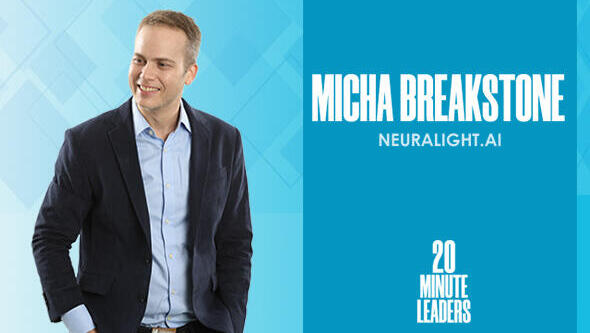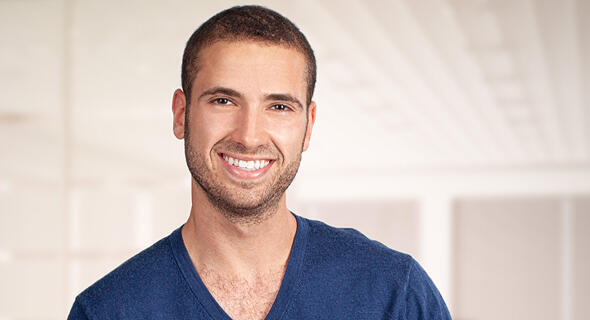
20-Minute Leaders
“We want to hire people that make us an integral part of their life.”
When Micha Breakstone and his co-founder were building NeuraLight, they knew how important it was to set the company’s values first.
When Micha Breakstone and his co-founder were building NeuraLight, they knew how important it was to set the company’s values first. They agreed on three core values that they continue to live by and reference when hiring. Breakstone, the CEO, explains it is crucial that employees have a passion for the urgent mission to measure the progression of neurological diseases. He says that he wants to hire people who will consider the work an integral part of their lives, not a separate piece. Breakstone shares that his grandfather’s battle with Alzheimer’s and a process of setting KPIs for his own life led to him moving into neurology, where diseases are not well understood and it is hard to measure their progression. He believes neurology will be big in the next decade, and he hopes NeuraLight’s work will help him reach his goal of making the world a bit better.
Click Here For More 20MinuteLeaders
You mentioned very briefly earlier that even though you’ve had amazing successes, you're seeing NeuraLight as your magnum opus and a legacy that you're going to leave in the world. Tell me how you see yourself as an entrepreneur.
I don't yet know that NeuraLight will be my magnum opus, but it is the dream that this is the legacy I leave behind.
A good friend gave me the book How Will You Measure Your Life? by Clayton Christensen. It's an exercise about building the KPIs for your own life. I did the exercise and I came back with these KPIs. The first is I want to leave the world a slightly better place behind me. Once you have that as a decision, it's very easy to decide what you're going to be doing next with your life.
The second is being a good family person, but also a good community person. Building a community and a strong family around me is really important and something I'm very happy to have done over the last couple of years. The third is to be an inspiring leader. I do think I am able to inspire people by example to do things. I'm guided by those three metrics.
I want to focus on NeuraLight. What is it?
More than 15 years ago, my grandmother died. I remember writing a short story that began with something like: “When my grandmother died, she had to do so again and again. Each time, we had to remind my grandfather again of my grandmother's death and the pain would hit him again as if it was the first time.” He had Alzheimer's, and he didn't remember each time we had to remind them that my grandmother had passed. I was starting from there and this very personal experience.
In neurology today, really none of these diseases have cures or drugs. It's just extremely hard to develop drugs when you don't understand the pathophysiologies, etiologies, or mechanisms. But also, very similar to Chorus, you can't improve what you don't measure.
Currently, there are simply no objective or sensitive endpoints for measuring the progression of neurological disorders, which basically makes it impossible to develop better cures and drugs and give good care. How do you know if a drug is working when 25 or 30% of the subjects in a trial don't actually have the disease because of 30% misdiagnosis?
What we're developing in a nutshell is this ability to accurately measure the progression of the diseases using standard devices, like a webcam. We also do machine learning. But we're really based in deep science. We use signal processing and computer vision to be able to discern these micro-movements in the eyes in order to monitor the progression of these diseases. We're approaching pharma companies to be able to help them design and build better studies that have a much higher chance of success.
Central nervous system drugs have only a 6% chance of being approved as compared to non-CNS drugs, which are more than double that rate. It shows you how hard it is to get a drug approved when you don't know what you're measuring.
I think all of us can relate to somebody we know with these diseases, myself with my own grandfather. Why haven't we been spending so much effort on this?
I don't have the full answer, but as human beings, we tend to take care of the urgent, not the important. Alzheimer's, MS, and Parkinson's are not quick killers, if killers at all. They take 20 years to kill, to disable you, to wreak havoc on your family. The pain is more subdued; it's over time.
Neurology, it's really important to note, is the largest global cause of disability. Disease prevalence has doubled over the last 10 years due to an aging population and so on. The expenditures are insane. On Alzheimer's alone, direct expenditures in the US are, I think, $256 billion. But they're slow and the pain is more subdued.
Plus, again, we don't yet understand the pathophysiologies for most of these diseases. Physicians are always biased towards understanding, like good scientists, what they're actually taking care of. It's very hard to try and solve something where you don't understand. The brain is a black box.
All of these efforts have been devoted to oncology because of it being a quicker killer and also understanding things. Neurology is 50, 60, 70 years behind oncology. There's no precision medicine for neurology whatsoever. There are very few disease-modifying treatments. There are no cures at all available. With the aging population, there's more openness to doing this. I do believe the next decade will be neurology's decade.
In the day to day feeling, environment, atmosphere, and culture, is there a difference when you're working on a product like Chorus versus NeuraLight?
First, it's much easier to hire. Also, before we started the path, we set three values for the company to put together the anchors culturally and the DNA. We spent days distilling this into three values. We actually want these three values to be used in real life. Every single interview and candidate decision, we fall back to our values.
The first is we're on an urgent mission. We're looking for people that are dedicated and passionate about actually changing the world for the better. Eddie and I still interview every single person. I share the values and I say, "This means that we don't like the phrase ‘work-life balance.’" I want to see their reaction.
We're looking for the people that think that this job will be a significant part of their life. We want you to feel that this job is an important and meaningful part of your life. Work-life harmony is fine. I want to see if people are scared of that (statement) or not. Not because we work crazy hours, though sometimes we do.
Anecdotally, we discovered a few weeks ago that a team of our engineers were working the entire weekend. Eddie and I were horrified because we had not asked for that. But they said, "We really wanted to start the trials early next week. And it was too important for us." We gave them, a few weeks later, an external happy day. What was really important for us is that we have people that make us an integral part of their life.
The third value is we enjoy the ride. The path is just as important as the goal.
The second value is psychological safety. Google found that the top performing teams are ones where people feel vulnerable enough to know that they'll never be dismissed, they'll always be empowered, etc. So that's a critical second value for us. I think those values actually reflect who we are as a company and how we make decisions.
Recently we had Gil Shklarski, the previous CTO of Flatiron, join as a scientific co-founder. I visited him in New York with my life partner and our baby daughter about half a year ago, and what most impressed me was not his IQ or how well he understood the space, but the fact all he cared about was making sure that my life partner and my daughter were taken care of.
Going back to your question, is there a difference? Yes. We're extremely intentional about our culture. We are looking to hire and bring in people that deeply care about this, are motivated by the goal, have the wherewithal to be vulnerable, would never be negative or dismissive in any way, and also enjoy the ride.
Michael Matias, Forbes 30 Under 30, is the author of Age is Only an Int: Lessons I Learned as a Young Entrepreneur. He studies Artificial Intelligence at Stanford University, is a Venture Partner at J-Ventures and was an engineer at Hippo Insurance. Matias previously served as an officer in the 8200 unit. 20MinuteLeaders is a tech entrepreneurship interview series featuring one-on-one interviews with fascinating founders, innovators and thought leaders sharing their journeys and experiences.
Contributing editors: Michael Matias, Megan Ryan
